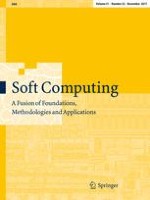28.06.2016 | Methodologies and Application
A zSlices-based general type-2 fuzzy logic system for users-centric adaptive learning in large-scale e-learning platforms
Erschienen in: Soft Computing | Ausgabe 22/2017
EinloggenAktivieren Sie unsere intelligente Suche, um passende Fachinhalte oder Patente zu finden.
Wählen Sie Textabschnitte aus um mit Künstlicher Intelligenz passenden Patente zu finden. powered by
Markieren Sie Textabschnitte, um KI-gestützt weitere passende Inhalte zu finden. powered by
